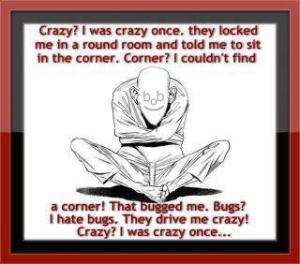“Let’s throw it all into the mix
And open up our bag of tricks
And party for the rest of the night” – Warren Zevon
Being bipolar isn’t all bad. Yes, there are unpredictable highs and lows. The depression can be crippling, but the hypomania isn’t always a bad thing. It’s also not as fun as people think it is when they learn what the symptoms are. First, let me explain a little about what hypomania means and the difference between that and mania.
The diagnosis of bipolar I or bipolar II lies in whether a person experiences mania or hypomania. Both manifest themselves in the same ways: an excited or even irritable mood, racing thoughts, lack of focus or concentration, a decreased need for sleep, being more talkative often with a rapid change of topic, hypersexuality, an increase of productivity and/or psychomotor agitation (pacing, hand wringing, general restlessness), an increase in self-esteem with possible delusions of grandeur, and finally, participation in pleasurable activities that can or will result in devastating consequences. Additionally, both mania and hypomania can include hallucinations. I’ve never experienced that particular symptom and I hope I never do, but in all honesty, there are some things I’ve done that I wish had been hallucinations.
The difference between mania and hypomania, and bipolar I and II is the severity of the manic symptoms. Mania is the more severe of the two and is symptomatic of bipolar I. Mania results in a definite impairment in functioning, being a danger to self or others,and possibly psychotic features. Episodes of mania must last at least seven days as part of the diagnostic criteria. Mania also necessitates hospitalization. As a sufferer of bipolar II, I have to deal with hypomania, which is less severe. There is no marked impairment in functioning, no necessity for hospitalization, and no psychotic features. Diagnostically, hypomania must last at least four days. Mania is more dangerous because it can put the life of the person and possibly those around them in danger.
Overall, bipolar disorder involves three possible moods, mania, hypomania, and depression (there are other conditions such as mixed mood and rapid cycling, but I’ll save those for another time). For me, hypomania is the preferable condition, but it is a double-edged sword. Sometimes it can be fun and other times it can be torturous, and sometimes it can have devastating consequences because of the fun. My hypomanic episodes have covered a wide range of experiences. I’ll discuss the bad ones first and get them out of the way. My activities, which I’ve previously blogged about, cost me my family, my job, my savings, and my dignity. I burned my entire life to embers and ash and I am thoroughly embarrassed by the things I did. This actually occurred while I was chasing the pleasurable experiences. I was able to stay up all night partying and spending absurd amounts of money. Although it seemed fun at the time, it was my lack of impulse control that led to destructive results.
Racing thoughts and irritability are troubling as well. I can have extended periods of anger, even approaching the point of rage, and the racing thoughts are a constant assault; a barrage of disjointed, repetitive, and uncontrollable ideas. I feel as if I’m being assaulted both externally and by my own mind as well. These are definitely not fun.
Paradoxically, there are times when I enjoy my hypomania. It is a welcome break from depression and I feel infinitely more energetic and creative. As an example, I began this blog in November of 2012 in a flurry of hypomanic behavior. I was sleeping less so I would write until the wee hours of the morning and as a result, I was posting nearly every day. As I began to cycle down out of the hypomania I posted less, and then eventually stopped altogether when I sank into depression. Now as I’ve restarted the blog, I’m back in treatment, on my meds and the hypomania is much less severe, so I have set the more realistic goal of publishing once a week rather than daily. Making use of my current hypomania, I’ve already completed several weeks worth of posts and scheduled them to be automatically published weekly (new blogs are posted Mondays at 6am if you want to read the latest while having your coffee).
Medication alone does not stop either depression or hypomania. There is no magic cure, but the symptoms can be more manageable. I still feel restless during my hypomania. I’ve had nights where if I don’t get out of the house I feel like I’m a prisoner. I begin pacing and I get irritable and easily agitated. Since medication is not a cure-all I need to find other ways to channel this excess energy. Obviously I write, but that’s not enough. I try to do constructive things like run errands; something productive to get me out of the house. I’ll go to the store or do laundry while listening to my iPod. It distracts me and drowns out my brain for a while. I get to accomplish things. I never would have thought that going grocery shopping or going to the laundromat would have therapeutic value, but it works. It’s also a hell of a lot cheaper than vodka, cocaine, and strip clubs.

